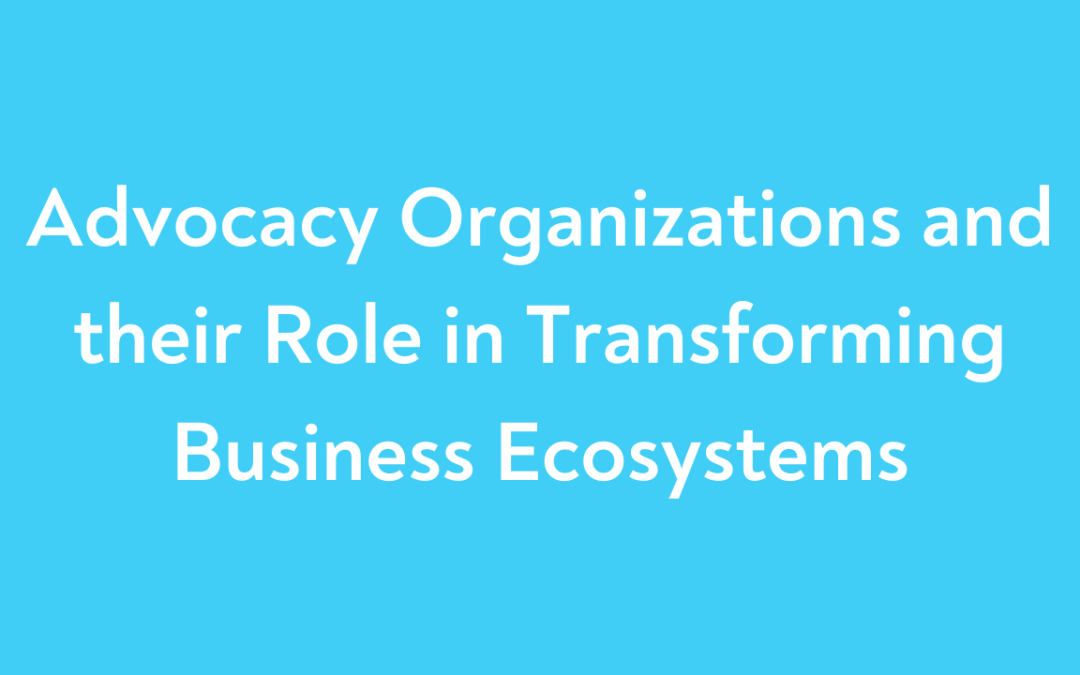Supplier diversity isn’t just a corporate or government endeavor. Advocacy organizations play an essential role in advancing inclusive economic development by supporting diverse businesses, connecting them with new opportunities, and helping align corporate supplier diversity efforts so that their collective impact can be far greater. From chambers of commerce to industry-focused associations, advocacy organizations have the potential to steward a new era of business where supplier diversity is recognized as a cornerstone of success.
In this guide, we’ll take a closer look at best practices, upcoming trends, and new technologies, with a focus on how advocacy organizations can accelerate their work towards building inclusive business ecosystems through supplier diversity.
Here’s what we’ll cover:
- Advocacy Organizations’ Influence on Diverse Suppliers and Industry Shifts
- Best Practices for Engaging with Advocacy Organizations
- Advocacy’s Role in the Future of Business: Key Developments to Monitor
- How Advocates Can Use Supplier Diversity Software to Advance Their Goals
- Strategies for Establishing an Inclusive Ecosystem for Sustainable Economic Development
- How Chambers of Commerce are Advancing Supplier Diversity
- Thinking of Starting a Business Diversity Association? Here’s How…
- A Closer Look at Chicago United’s Strategy for Regional Inclusive Procurement
Let’s begin!
The Impact of Advocacy Organizations on Diverse Suppliers and Industry Dynamics
Advocacy organizations support diverse suppliers by providing resources, building networks, and lobbying for equitable policies. They also facilitate connections between diverse suppliers and corporations, broadening access to opportunities.
[Link to article: “How advocacy organizations support diverse Suppliers and Influence Industries”]
Communicating with Advocacy Organizations
Engaging effectively with advocacy organizations can not only amplify your diversity efforts but also open up opportunities for knowledge sharing, innovation, and growth. By understanding their mission, being transparent about your own organization’s intentions, and actively collaborating, you can foster a genuine relationship with advocates.
[Link to article: “Best Practices for Communicating Effectively with Advocacy Organizations”]
The Future of Advocacy in Supplier Diversity & Business
Advocacy is shaping future business landscapes through environmental, social, and governance (ESG) factors, technological innovation, and increased transparency and accountability. Regardless of who they’re serving, advocacy organizations can guide businesses from all industries in adapting to these trends.
- Energy & Utilities: [Link to article: “The Future of Advocacy in Business: Trends to Watch in the Energy & Utilities Industry”]
- Hospitality: [Link to article: “The Future of Advocacy in Business: Trends to Watch in the Hospitality Industry”]
- Food & Beverage: [Link to article: “The Future of Advocacy in Business: Trends to Watch in the Food & Beverage Industry”]
- Entertainment: [Link to article: “The Future of Advocacy in Business: Trends to Watch in the Entertainment Industry”]
How Advocates Can Utilize Supplier Diversity Software
Supplier diversity software serves as a powerful platform that automates, streamlines, and enhances the supplier diversity process. While many software solutions offer these advantages, we encourage advocates to consider solutions like Hire Ground that are backed by a deep understanding of the supplier diversity landscape. Such software is built to not only manage and track diversity programs but also to foster connections, building a thriving community that drives inclusive economic growth.
[Link to article: “How Advocates Can Advance Their Goals with Supplier Diversity Software”]
Crafting an Inclusive Ecosystem for Equitable Economic Growth
Aligning interests, setting shared goals, and fostering collaboration are key in creating a multi-stakeholder ecosystem for inclusive economic development. Businesses must commit to fair procurement practices while partnering with advocacy organizations to drive industry-wide initiatives.
[Link to article: “How to build a multi-stakeholder ecosystem for inclusive economic development”]
The Role of Chambers of Commerce in Promoting Supplier Diversity
Chambers of commerce can drive supplier diversity by endorsing diverse suppliers and providing necessary resources for growth. Their influential role stimulates equitable economic development and a vibrant business community.
[Link to article: “How a chamber of commerce can (and must) drive supplier diversity”]
Strategies for Starting a Business Diversity Association
Starting a business diversity association can be a powerful way to promote supplier diversity practices within the corporate world. However, it can also be a complex process that requires strategic planning, a clear mission, and a robust network. While challenging, taking on this process can have a profound, lasting impact on your business community.
[Link to article: “How to start a business diversity association”]
A Regional Approach to Inclusive Procurement
Chicago United is a prime example of facilitating inclusive procurement, cultivating relationships, offering training, and driving policy changes. Their approach offers a blueprint for other businesses that are looking to follow suit.
[Link to article: “Case Study: How Chicago United Built an Regional Ecosystem for Inclusive Procurement”]
Supporting advocacy organizations aids the development of more equitable and inclusive industries. Let’s all commit to partnering with these organizations to drive impactful change and build a better future for our businesses and communities.


Recent Comments